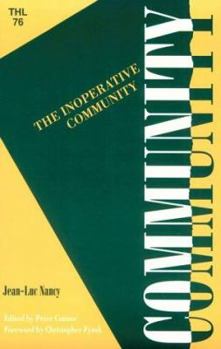Inoperative Community: Volume 76
Select Format
Select Condition 
Book Overview
This work examines community as an idea that has dominated modern thought and traces its relation to concepts of experience, discourse and the individual. Contrary to popular Western notions of community, the author shows that it is neither a project of fusion nor production. Rather, he argues, community can be defined through the political nature of its resistance against immanent power.
Format:Paperback
Language:English
ISBN:0816619247
ISBN13:9780816619245
Release Date:June 1991
Publisher:University of Minnesota Press
Length:224 Pages
Weight:0.71 lbs.
Dimensions:0.5" x 6.0" x 9.0"
Customer Reviews
3 ratings
Thinking at crossroads
Published by Thriftbooks.com User , 15 years ago
Nancy has written on topics as diverse as poetry/aesthetics, history of (the closure) of metaphysics/philosophy, freedom, and what he has called "the deconstruction of Christianity," after first writing books on the Jena (romantic) group and one of Jacques Lacan's essays "The title of the letter." I see his writing as less labyrinthine than other French thinkers; in this book, perhaps, he helps us understand WHY it is a maze (why reading/thinking has to do with the deferral of meaning, the suspension of ____, rather than with "the communication of meaning"). The shortest essay in this collection, "Literary Communism," is a great example of this and is a great entry way into the rest of the book. Nancy's thinking process approaches the straightforward. His "propositions" do not ask you to blankly accept them, but rather invite you to think with them, and the prose takes us through his movements. Often, he will turn a phrase in six or seven directions to get the reader focused on different implications, different avenues, to consider meaning alongside with nonmeaning and negation (see page 89 per the phrase: "Love is the extreme movement, beyond the self, of a being reaching completion"). And yet, Nancy is never for ambiguity and is never without proposition: when we stick with his ideas we see the reason for all these twists and turns. The ("argumentative") FOCUS of each chapter leads each to the next as much as they stand wholly on their own (though perhaps they cannot 'live' without each other-- Nancy's texts are always retracing themselves). Nancy is reading a HUGE tradition and weaving them together in a way that gives us a window into a way of thinking through this tradition. I would characterize Nancy's whole work as a type of READING: he tries to let thinkers speak where they could not, to say what they were ("structurally") unable (including himself as time goes on, I think). He seems to let no thinking of the past go away, accepting all of it as there because it is to contribute. Derrida describes him quite adequately (and with all the philosophical implications for the tradition): PUNCTUAL. One gets the feeling that these essays were for the man Jean-Luc quite essential to his being-here with us-- But also that he has written, perhaps more than any other thinker, for US, that the whole past of philosophy (or at least of the more modern French writers) could not do without. He will be the first to tell you in this book that "community" can only mean the continued articulation of a meaning that is constitutively deferred; again, this emphasizes the space of writing. This means: space for dialog and breathing. Nancy and Blanchot are exemplary as far as constituting this "conversation" in their texts (as when N writes: "Here, I must interrupt myself: it is up to you to allow to be said what no one, no subject, can say, and what exposes us in common.") The philosophy presented in this book keys around a focal point in all of Nancy's think
A difficult but hugely important book.
Published by Thriftbooks.com User , 23 years ago
This book has been very influential in France. If you don't take your philophy neat, of if you are new to Nancy's thought, then I recommend starting with Maurice Blanchot's _The Unavowable Community_, which relates Nancy's concept of finitude to the work and life of Georges Bataille. Blanchot shows why, in the face of the various totalitarianisms of the 20th century, we should care about Nancy's work.
Worth careful reading
Published by Thriftbooks.com User , 25 years ago
Contrary to the previous reviewer, this collection of essays is well worth reading. Of course one can disagree with points made here or there, but if you take the time to actually read the thing I don't see how one can leave the book without having experienced a huge degree of mental stimulation. Yes, it's written in a meandering style, but following the thoughts is the whole point. So--if you like thinking, that is--I say this book is of 4-star calliber!






